Emotion Regulation Therapy in Calgary | Rewrite Your Emotional Story with Clarity and Confidence
When Your Emotions Feel Bigger, Faster, or Harder to Manage Than You’d Like
Everyone feels strong emotions — but for some people, feelings arrive with more intensity, last longer than expected, or become overwhelming before there’s time to process them. You might move between irritability and shutdown, feel flooded by stress without knowing why, or struggle to express what’s happening inside.
Emotion regulation isn’t about controlling or suppressing how you feel. It’s about understanding your emotional patterns so you can respond with steadiness instead of reactivity.
At NU Psychology, our Calgary psychologists help adults and teens build emotional clarity, resilience, and confidence — even during difficult moments.
Your emotions don’t need to shrink. They just need room to be understood.
What Emotional Dysregulation Feels Like
Emotion regulation challenges can show up in subtle or intense ways. You may notice:
Reacting quickly, then regretting it later
Feeling overwhelmed by small stressors
Shutting down or going numb when emotions feel too big
Difficulty explaining what you feel or why
Irritability that “comes out of nowhere”
Emotions lingering long after the moment has passed
Crying easily, or not at all, even when you want to
Feeling like you’re “too sensitive” or “not sensitive enough”
Many people think they should be able to manage their emotions better — but emotional responses are shaped by stress, the nervous system, upbringing, and life experience.
Why This Happens
Emotional intensity isn’t random — it’s shaped by earlier patterns, your environment, and how your nervous system learned to react.
Common contributors include:
Past experiences where emotions weren’t safe to express
Perfectionism and internal pressure
Family patterns around communication
People-pleasing or conflict avoidance
Difficulty identifying emotions as they arise
Emotion regulation begins with understanding the “why,” not forcing change.
How NU Psychology Supports Emotion Regulation
Our approach is warm, grounded, and paced gently. We focus on helping you understand your emotional world — not pushing you into skills before you’re ready.
We integrate:
DBT-informed tools for grounding, distress tolerance, and reducing reactivity
Narrative Therapy for softening old stories about being “too much” or “too emotional”
Our goal is to help you feel more connected to your emotions — not controlled by them.
You might be ready if:
Your reactions feel bigger than the situation
You feel drained or ashamed after emotional moments
You avoid conflict because you fear becoming overwhelmed
You shut down when things feel too intense
You replay emotional moments long after they pass
People say you’re “sensitive,” “cold,” or “hard to read”
You want a calmer, steadier internal world
If your emotional patterns feel confusing, exhausting, or unpredictable, therapy can help you understand them with compassion and clarity.

How Therapy Helps With Emotion Regulation
Therapy supports you in building skills, insight, and emotional steadiness that make daily life feel more manageable.
We help you:
Understand emotional triggers and patterns
Create space between the feeling and the reaction
Soften self-criticism and shame around emotions
Communicate needs without shutting down or escalating
Respond instead of reacting
Build grounding routines that support your nervous system
Understand how stress affects your body and mind
Develop emotional flexibility
Many clients working on emotion regulation also explore CBT, DBT-informed skills, or IFS/Parts Work depending on their personal patterns.
Starting now helps you:
Prevent emotional overwhelm from turning into burnout
Calm the nervous system so emotions feel less explosive or draining
Improve communication and confidence in relationships
Respond more intentionally to stress
Feel more grounded and connected to yourself
Reduce shame and self-blame around emotional experiences
Emotion regulation isn’t about eliminating emotion — it’s about building emotional safety, stability, and insight.
Stress Support for Teens & Adults
Teens & Young Adults
Teens often feel emotions intensely and quickly. Therapy helps them understand emotional cues, manage overwhelm, communicate more confidently, and feel more grounded in relationships and daily stress.
Adults
Adults may struggle with emotional exhaustion, reactivity, suppression, or feeling disconnected from their emotional needs. Therapy helps build steadiness, reduce overwhelm, and shift long-term emotional patterns.
Start Emotional Regulation Therapy in Calgary
If you want steadier emotional patterns, clearer communication, and relief from overwhelm, support is here. We’ll help you understand your emotions in a way that feels kind, grounded, and empowering.
NU Psychology is located in Killarney, Calgary, easy to reach from:
Aspen Woods · West Springs · Cougar Ridge · Discovery Ridge · Springbank · Signal Hill · Strathcona · Mount Royal · Altadore · Bankview · Glendale · Westgate · Wildwood · Hillhurst · Sunalta · Lakeview.
📍 2005 – 37 St SW, Unit #4, Calgary
📞 403-217-4686
Frequently Asked Questions
-
Not exactly. We use DBT-informed tools, but therapy is customized — not a structured DBT program.
-
Often due to stress, upbringing, trauma, ADHD, or learned emotional patterns.
-
No. Emotions aren’t the problem — overwhelm and reactivity are. Therapy helps with both.
-
That’s common. Therapy helps you build emotional awareness slowly and safely.
-
Yes — many clients prefer online sessions for comfort and convenience.




